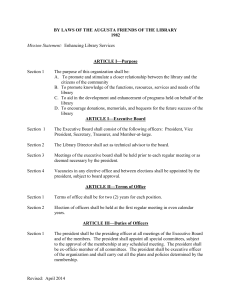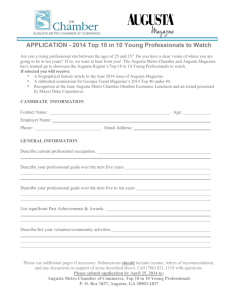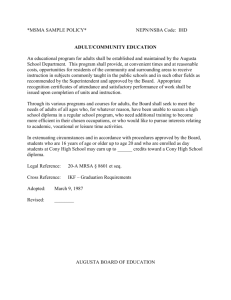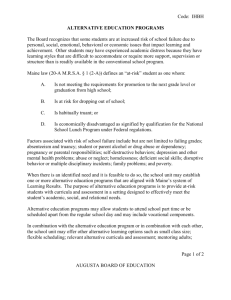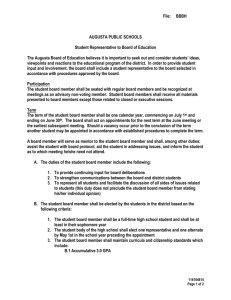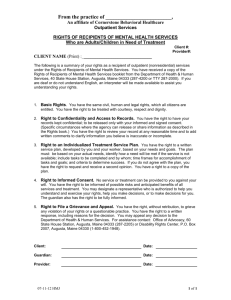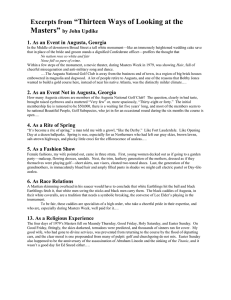Context Statement - Port Augusta Special School
advertisement
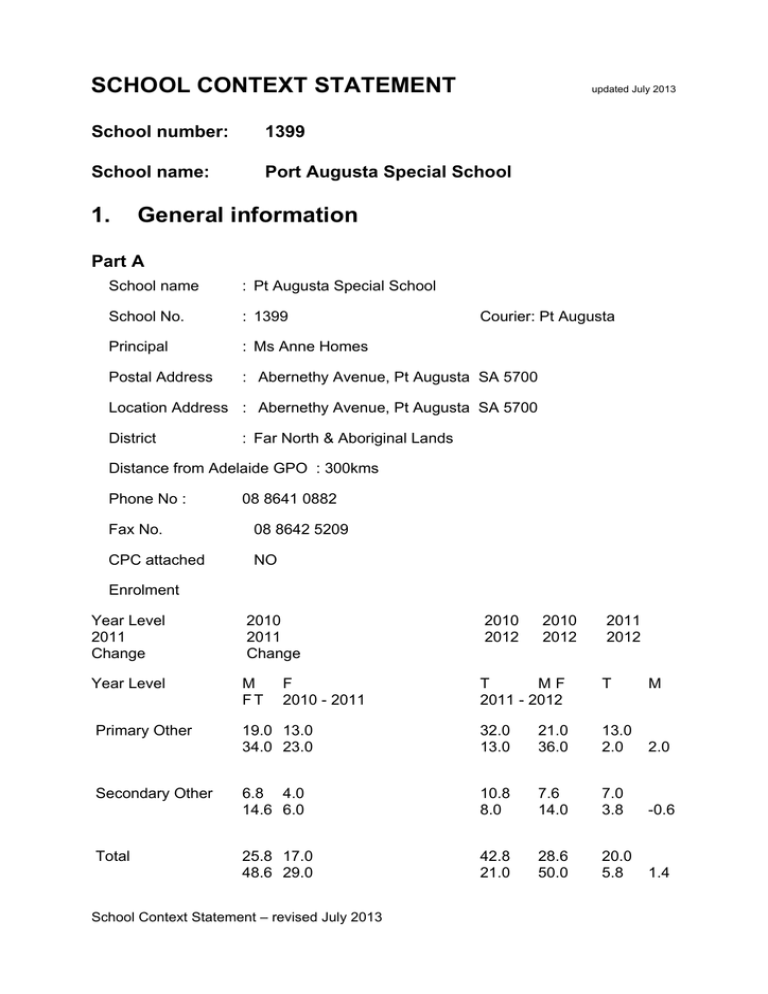
SCHOOL CONTEXT STATEMENT updated July 2013 School number: 1399 School name: Port Augusta Special School 1. General information Part A School name : Pt Augusta Special School School No. : 1399 Principal : Ms Anne Homes Postal Address : Abernethy Avenue, Pt Augusta SA 5700 Courier: Pt Augusta Location Address : Abernethy Avenue, Pt Augusta SA 5700 District : Far North & Aboriginal Lands Distance from Adelaide GPO : 300kms Phone No : 08 8641 0882 Fax No. 08 8642 5209 CPC attached NO Enrolment Year Level 2011 Change 2010 2011 Change 2010 2012 Year Level M FT T MF 2011 - 2012 T M Primary Other 19.0 13.0 34.0 23.0 32.0 13.0 21.0 36.0 13.0 2.0 2.0 6.8 4.0 14.6 6.0 10.8 8.0 7.6 14.0 7.0 3.8 -0.6 25.8 17.0 48.6 29.0 42.8 21.0 28.6 50.0 20.0 5.8 1.4 Secondary Other Total F 2010 - 2011 School Context Statement – revised July 2013 2010 2012 2011 2012 Part B • Deputy Principal’s name Phil Oliver (.5FTE) • School e-mail address dl.1399.info@schools.sa.edu.au • Staffing numbers Principal 1.0 FTE Deputy .5FTE 8.1 FTE teaching positions ( comprising of 7 classroom teachers , .5 FTE NIT teacher,.4FTE teacher SSO ( level 1) in each classroom plus additional SSO’s for special programmes – 2 SSO’s have dual roles as Health Support Officers (HSO) 1.0FTE SSO2 Administration plus additional SSO1 time for administration ICT technical support x 3 hours per week GSE1 Groundsperson X 2 hours per week • OSHC N/A • Enrolment trends Expect enrolment to remain steady – 47 FTE Term 2, 2013. Transition planning to special school, at times, sees students transfer from mainstream classes and special classes to the special school. Enrolment also occur directly from early childhood settings Students transfer to and come from other special schools • Special arrangements The school is adjacent to Willsden Primary School and currently occupies two of their classrooms The school links with other rural special schools for some student activities Transport to and from school for students is provided by DECD via the local taxi company. • Year of opening An Annexe of the Whyalla Special School commenced operating in Pt Augusta in 1982. The facility became autonomous in January 1989 and was known as the Port Augusta Special Learning Centre. The Minister of Education granted school status in April 1990 and the first School Support Grant was received. A Principal was appointed in 1991. • Public transport access Local public transport has a stop 25 metres from school administration building School Context Statement – revised July 2013 2. Students (and their welfare) • General characteristics All students enrolled at the school have an intellectual disability and meet the DECD Students with Disabilities policy. In addition, some students have physical and sensory impairments. The school offers Reception to Year 12 curriculum The school is fully fenced to provide a safe and secure environment. The Governing Council owns two buses ( Toyota 22 seater ) which are available to provide access to community based curriculum activites • (Pastoral) care programs N/A • Support offered Agencies ( Novita, AutismSA and local allied health services ) provide a consultative service to staff and families DECD services ( Kilparrin, SERU and services through the Regional Office – speech pathology, disability coordinator, hearing impairment services, behaviour management ) are also utilised • Student management All students have a Negotiated Education Plan (NEP) which is reviewed in Term 1 of each year or as required. Student issues and concerns are managed through this review process in consultation with parents & carers. The school strives to provide a safe and secure environment for students and staff Behaviour management guidelines have beeen reviewed to support this objective. • Student government Through class based meetings, students are encouraged to discuss, participate in and contribute to decision making for the benefit of all. School Context Statement – revised July 2013 • Special programmes • All students are able to participate in an extended swimming programme. In Terms 1 & 4 students swim at the Pt Augusta swim centre, in Terms 2 & 3 students travel to Whyalla Leisure Centre for swim lessons in the heated pool. • Picture Exchange Communication System ( PECS ) is used across the school to enhance communication for non verbal students and to provide a common platform for visual schedules for all students. • An active learning room has been established to support students with high sensory needs • A music teacher (from DECD Instrumental Music Service) provides 2 music lessons each week for primary and secondary students. • A sport programme, accessed by all students is delivered once a week by an SSO. A small group of students attend Kindergym as part of this programme. Senior students have the opportunity to access sport activities in community settings, such as table tennis. • Two work education programmes (one in conjunction with the Pt Augusta City Council and the other in conjunction with the Pt Augusta Quilters Guild) offer work experience opportunities for secondary aged students. 3 Key School Policies • School Improvement Plan (2011 - 2013) Priority Areas from School Improvement Plan are 1. Student Well Being & Attendance 2. Literacy 3. Numeracy 4. SACE (Modified) • Facilities Pt Augusta Special School was successful in being considered for, and receiving the funding for a new purpose built school. This project is currently underway and it is anticipated to be completed during the 2014 school year. • Recent key outcomes 1. Music -The school has access to a music teacher for 2 lessons per week Classroom staff support the music teacher to deliver the programme Provide a range of resources to support programme • Offer the opportunity for public performance at school assemblies and an annual combined schools concert 2. Health & Physical Activity - To promote increased physical activity all students are encouraged to participate in the Premiers BE ACTIVE Challenge • each student keeps an activity log for 1 month School Context Statement – revised July 2013 each student is presented with a medal ( for completing the challenge ) at the end of year school assembly 3. Ongoing review of school policies : Sun Smart policy, Grievance Procedure for Staff and Grievance Procedure for Parents, student supervision, Behaviour Management and Bullying & Harassment have been reviewed 4. Curriculum • Subject offerings Australian Curriculum with a focus Capabilities is the focus to describe R-10 curriculum. South Australian Certificate of Education (Modified) is offered for the post compulsory students All AC subjects are delivered with modifications and adaptations as reflected in individual student NEP’s • Open Access N/A • Special needs All students are identified as having special needs • Special curriculum features School focus is on functional literacy and numeracy, communication, social skills and work skills that link to independence for life beyond school • Teaching methodology Is adjusted to meet the learning needs of individual students A strong emphasis on visual strategies and charts Learning is contextualised, relevant and meaningful • Assessment procedures and reporting Student learning is assessed against goals set in individual NEPs. NEP’s are reviewed each year Written reports are provided for parents twice a year, in terms 2 & 4, using a common reporting format School Context Statement – revised July 2013 5. Sporting Activities The school participates in the Premiers BE Active Challenge Students attend the local gym, kindergym and have access to extended swimming programme. The school participates in combined ( special ) schools sport days 6. • 7. Other Co-Curricular Activities General School camps / sleepovers as organised by classroom teachers Sport days combined with other special schools Splash Day at the end of each year Whole of school activities as organised by ther “well being” focus group Staff (and their welfare) • Staff profile 2 male teachers, 5 female teachers, all 1.0 FTE 1 x .4 FTE female teacher ( special programmes) 9 female SSO’s for classroom support 2 SSO staff trained as HSO’s 1 male SSO’s 2 female SSO’s ( 1 x SSO2 1.0 FTE for finance & admin support ) 1 female SSO admin support x 10 hrs 1 male ICT support SSO 1 male Groundsman • Leadership structure Principal Deputy Principal Personnel Advisory Committee Technology Focus Group Well being Focus Group “Relocation” Working Party • Staff support systems Whole of staff meeting each fortnight ( weeks 1,3,5,7,9,) Teacher only meeting each fortnight ( weeks 2,4,6,8 10 ) Ancillary staff meeting twice a term ( weeks 4,10 ) School Context Statement – revised July 2013 • Performance Management Meet with principal beginning of each year/ review at end of year Staff cohorts meet to discuss & review issues, concerns & to share successes • Staff utilisation policies Cooperative classroom workgroups and teamwork across the school is an expectation of all staff • Access to special staff The school is visited by Kilparrin Teaching and Assessment Unit staff and staff from Novita on a regular basis. The school has access to DECD Speech Pathologists, Guidance Officer and Behaviour Management Support personnel. They visit the school on a regular basis and have direct input to student programming. Occupational Therapists and Physiotherapists from Flinders Terrace Health Centre regularly visit the school. Pika Wiya Aboriginal Health Centre can be contacted at any time. The school can also call directly on the services of the Port Augusta Hospital’s paediatrician. Support services are also available from the Regional Office The school has a working relationship with DisabilitySA in planning transition from school. 8. Incentives, support and award conditions for Staff Full details of incentives can be found on the DECD website. 9. School Facilities • Buildings and grounds There are 2 key buildings, connected by an enclosed and covered walkway. One building comprises the teaching block, the other the administration office, staffroom and resource centre. 2 classes are located at Willsden Primary School • Cooling The school is fully airconditioned • Specialist facilities School is able to negotiate the provision of additional support from DECD and nonDECD agencies • Student facilities Students have full access to a redeveloped play ground area, sporting equipment, resource centre and computers. Two buses (owned by the Governing Council) are available to provide transport for community based learning . Students also utilise the Willlsden primary School Gym and activity room School Context Statement – revised July 2013 • Staff facilities The staff have regular amenities in the staff room. Each teacher is provided with a laptop with wireless internet access for professional use. School mobile phones are provided for staff to use when on curriculum excursions with students. • Access for students and staff with disabilities The site is fully accessible for students and staff with disabilities • Access to bus transport The site is accessible by public transport. 10. School Operations • Decision making structures Decisions are made through collaborative process at PAC / staff / teacher meetings and minuted accordingly. All meeting agenda & minute books are available in the staff room • Regular publications A school newsletter is published three times a term A weekly bulletin is provided to staff that chronicles all site events / meetings / visitors. Information in relation to Profedssional Development and DECD information is also disseminated via the weekly bulletin. • Other communication Each student has a diary that is used to communicate between school and home. Staff phone parents/carers to discuss issues, concerns as necessary • School financial position The school finanacial position is sound. • Special funding The school receives funds & targeted grants from DECD as well as federal funding for specific projects 11. Local Community • General characteristics The City of Port Augusta, 300kms north of Adelaide, is situated at the head of Spencer Gulf and at the foothills of the Flinders Ranges, and is a city with a long and proud history. The city, which is built on both sides of Spencer Gulf, has a population of more than 15000 people and caters to the needs of families living on sheep and cattle stations in the far north and smaller surrounding towns. The Open Access College, School of the Air and the Royal Flying Doctor Service are based at Port Augusta. Educational facilities: Six primary schools. Secondary school. Pre-school, kindergarten and day care facilities. Special school. School Context Statement – revised July 2013 Caritas College – R-12 college, MacKillop House – Hostel for Rural Students. Spencer Institute TAFE. For further community information refer to Pt Augusta City Council website - • Parent and community involvement The school has an active Governing Council. Governing Council meets twice each term, in weeks 4 & 8. • Feeder schools Pt Augusta Special School provides a learning environment for eligible students from Pt Augusta, Stirling North, Quorn and Wilmington. • Other local care and educational facilities Pt Augusta has a number of primary schools, one secondary school, child care and early childhood centres and a private school • Commercial/industrial and shopping facilities Pt Augusta has a central shopping hub ( Commercial Road ) plus smaller shopping centres at Louden Road (on the Westside) and Carlton Parade • Other local facilities Pt Augusta has a full range of sporting and recreational facilities • Availability of staff housing Adequate, via private rental or Government Housing • Accessibility Pt Augusta can be accessed by road, air and bus. • Local Government body Pt Augusta City Council 12. Further Comments I certify this to be a true and accurate statement. Anne Homes Principal July, 2013 School Context Statement – revised July 2013 D:\Documents\Anne\Site Plans\School Context Statement 2012 update.doc School Context Statement – revised July 2013
